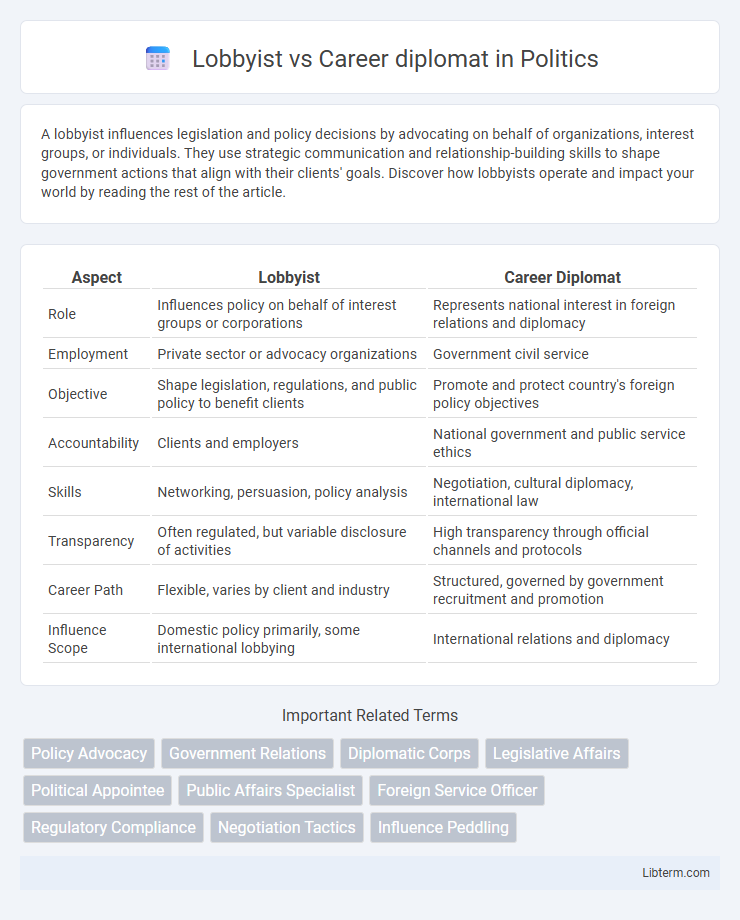A lobbyist influences legislation and policy decisions by advocating on behalf of organizations, interest groups, or individuals. They use strategic communication and relationship-building skills to shape government actions that align with their clients' goals. Discover how lobbyists operate and impact your world by reading the rest of the article.
Table of Comparison
| Aspect | Lobbyist | Career Diplomat |
|---|---|---|
| Role | Influences policy on behalf of interest groups or corporations | Represents national interest in foreign relations and diplomacy |
| Employment | Private sector or advocacy organizations | Government civil service |
| Objective | Shape legislation, regulations, and public policy to benefit clients | Promote and protect country's foreign policy objectives |
| Accountability | Clients and employers | National government and public service ethics |
| Skills | Networking, persuasion, policy analysis | Negotiation, cultural diplomacy, international law |
| Transparency | Often regulated, but variable disclosure of activities | High transparency through official channels and protocols |
| Career Path | Flexible, varies by client and industry | Structured, governed by government recruitment and promotion |
| Influence Scope | Domestic policy primarily, some international lobbying | International relations and diplomacy |
Introduction to Lobbyists and Career Diplomats
Lobbyists influence government policy and decisions by advocating on behalf of interest groups or corporations, using strategic communication and relationship-building to shape legislation. Career diplomats represent their country's interests abroad, managing international relations through negotiation, cultural exchange, and policy implementation within foreign services. Both roles require deep expertise in political systems, but lobbyists operate primarily within domestic political spheres while diplomats focus on international affairs.
Defining the Roles: Lobbyist vs Career Diplomat
A lobbyist is a professional advocate who seeks to influence government policy and decision-making on behalf of private clients, interest groups, or corporations through targeted communication and strategic relationships. A career diplomat represents their nation's government abroad, managing international relations, negotiating treaties, and promoting national interests through official diplomatic channels. Unlike lobbyists, career diplomats operate within formal government structures and adhere to strict codes of conduct and protocol while advancing foreign policy objectives.
Key Responsibilities and Functions
Lobbyists focus on influencing legislation and public policy by advocating for specific interest groups, engaging in direct communication with lawmakers, and organizing grassroots campaigns. Career diplomats represent their country's interests abroad, manage international relations, negotiate treaties, and report on political and economic developments in host countries. Both roles require strategic communication skills, but lobbyists emphasize persuasion and advocacy, while diplomats prioritize negotiation and diplomacy within formal government channels.
Educational Background and Skill Sets
Career diplomats typically hold advanced degrees in international relations, political science, or law, emphasizing skills in negotiation, cultural sensitivity, and policy analysis. Lobbyists often possess diverse educational backgrounds, including business, law, or communications, with strong expertise in persuasion, networking, and understanding legislative processes. Both roles require strategic thinking, but career diplomats prioritize diplomatic protocols and foreign affairs, whereas lobbyists focus on influencing policy outcomes within political systems.
Work Environment and Spheres of Influence
Lobbyists operate primarily in dynamic, high-pressure environments such as legislative offices, corporate settings, and public forums, where they influence policy decisions by advocating for specific interest groups. Career diplomats work within government institutions and international organizations, navigating complex political landscapes and cultural contexts to represent national interests and foster diplomatic relations. While lobbyists leverage personal networks and media to shape legislation, diplomats rely on formal negotiation, protocol, and multilateral cooperation to impact foreign policy outcomes.
Ethical Considerations and Accountability
Lobbyists often face scrutiny regarding transparency and potential conflicts of interest, as their advocacy may prioritize private interests over public good, raising ethical concerns about undue influence. Career diplomats are held to strict codes of conduct and government accountability standards, emphasizing impartiality and national interest in decision-making processes. Both roles require robust ethical frameworks, but career diplomats operate within formal accountability structures, while lobbyists depend largely on regulatory oversight and self-regulation to maintain ethical standards.
Impact on Policy and Decision-Making
Lobbyists influence policy and decision-making by actively advocating for specific interests, leveraging relationships with lawmakers and stakeholders to shape legislation and regulatory outcomes. Career diplomats impact policy through long-term negotiation, diplomacy, and strategic advice in international relations, ensuring national interests are represented consistently on the global stage. While lobbyists focus on immediate policy changes benefiting particular groups, career diplomats contribute to sustained, broad-based foreign policy development and implementation.
Career Paths and Progression
Career diplomats typically pursue a structured career path within a country's foreign service, beginning with entry-level diplomatic training and gradually advancing through consular, policy, and ambassadorial roles based on merit and seniority. Lobbyists often follow diverse career trajectories, leveraging experience in law, politics, or industry to influence government policy, with progression tied to client acquisition and networking success rather than formal promotion. Professional growth for career diplomats involves specialized foreign language training and international postings, contrasting with lobbyists' focus on relationship-building and issue-specific expertise.
Advantages and Challenges in Each Profession
Lobbyists leverage extensive networks to influence policy decisions, offering agility and focused expertise in specific industries, but face challenges related to public perception and regulatory scrutiny. Career diplomats possess deep understanding of international relations and negotiation skills, ensuring long-term strategic interests for their countries, yet often navigate complex bureaucratic structures and slower decision-making processes. Both professions demand strong communication abilities and adaptability, but lobbyists operate in dynamic, competitive environments while diplomats engage in formal, protocol-driven contexts.
Conclusion: Comparing Influence and Effectiveness
Lobbyists leverage specialized knowledge and extensive networks to influence policy decisions rapidly through targeted advocacy and strategic communication. Career diplomats possess deep institutional understanding and long-term relationship-building skills that enable them to navigate complex international negotiations and government protocols effectively. Ultimately, while lobbyists excel in exerting immediate pressure and shaping specific policies, career diplomats deliver sustained influence through consistent, trust-based engagement within formal diplomatic channels.
Lobbyist Infographic

 libterm.com
libterm.com